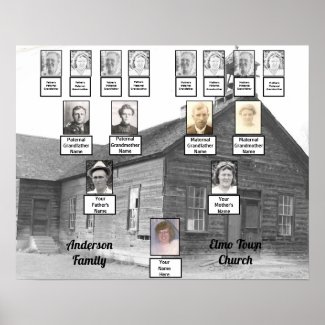For instance, I haven't had a cold in over three years, but I caught one this year and I spend a few days sleeping as soon as I would get home from work. There were many things I would have done during that time that I was sleeping, like adding to this website; but I felt sleeping and getting well were more important.
Life is full of times when things are difficult and don't go the way we want them to. Perhaps it is a sick family member that we spend our time helping. Perhaps it is repairing something that is broken. Perhaps it is cleaning up after a disaster.
When we record our family's story we may want to remember only the good times. Definitely, the good times should be remembered, but the things that were learned from the bad times can be just as valuable to your family.
A bout of depression may be difficult to write about, but some years from now a grandchild or great-grandchild may be dealing with depression and may be glad to learn what you did to cope with your depression. If you recovered quickly from your depression, they may want to try what you did. If you struggled despite all you tried to overcome the depression, they may know that something else may be necessary to help. Although no two situations are exactly the same and so the solutions may not be the same, it may help to know that someone else struggled with the same problems. So, as you write your story remember to include the difficult times as well as the good times. Record what you learned from both your good and bad experiences.
Think about your ancestors. What kinds of adversity did they have to deal with? What was it like for those who lived during the depression? Maybe you had some ancestors involved in the gold rush. What was it like for them? Maybe some of your ancestors were pioneers. What was it like for them? Maybe some of your ancestors were the first settlers in an area or even a country. What was it like for them? There have been many people who have lived without running water, electricity, indoor bathrooms, a variety and abundance of food, nice clothing, heat in the winter, and cooling in the summer. Write about what conditions your ancestors lived in. Cameras, telephones, computers, electricity, cars, books, even the ability to read and write are relatively recent in the history of the world.
When writing an ancestor's story, researching history during that time period to find out what things were like would help to add depth and understanding to their story. When you interview relatives for their life stories or other ancestor's stories, remember to ask how the things that were happening in the world around them affected them. If they lived during the depression, were their parents employed or unemployed? During World War II were they affected by rationing or by a family member serving in the war? In the '60s how were they affected by the Civil Rights movement?
We are not alone and unaffected by others around us. What is going on in the world does affect us. The clothes we wear, the cars we drive, the things we have in our home, how we spend our spare time can all be affected by what is going on in the world. Yet each person may choose to not be affected in the same way as others. Perhaps if you are like me you drive a 25-year-old car, don't keep up with the latest fashion, don't watch a lot of TV, don't see all the latest movies, yet the new cars, the fashions, television, movies, etc. do affect your life because of how they affect others.
Each story will be unique. Not all the veterans of World War II have the same story of their war experiences. Each story is different even though it is about the same war. So write about the uniqueness as well as the commonalities in your family's story.


No comments:
Post a Comment